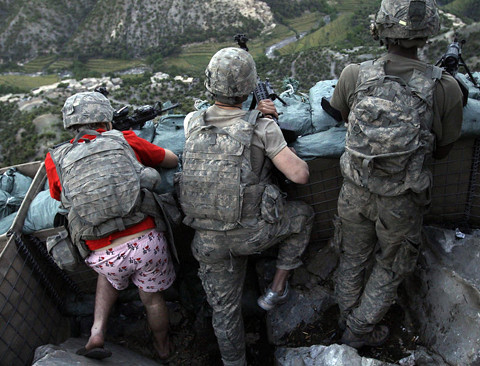
Soldiers from the U.S. Army First Battalion, 26th Infantry take defensive positions at firebase Restrepo after receiving fire from Taliban positions in the Korengal Valley of Afghanistan’s Kunar Province on May 11, 2009. (AP Photo/David Guttenfelder)
More than 40 U.S. soldiers have been killed, and scores more wounded, in helicopter crashes, machine-gun attacks and grenade blasts in the Korengal Valley, a jagged sliver just six miles deep and a half-mile wide. The Afghan death toll has been far higher, making the Korengal some of the bloodiest ground in all of Afghanistan, according to U.S. and Afghan officials.
In the pre-dawn hours of Wednesday, the American presence here came to an abrupt end.
For U.S. commanders, the Korengal Valley offers a hard lesson in the limits of American power and goodwill in Afghanistan. U.S. troops arrived in 2005 to flush out al-Qaeda and Taliban fighters. They stayed on the theory that the American presence drew insurgents away from areas where the United States had a better chance of fostering development. The troops were, in essence, bullet magnets.
“Bullet magnets!” Put that on all those recruitment posters that Army recruiters plaster all over inner-city neighborhoods!
And at the very end, we paid off the Taliban to permit us to run away in peace, for 6,000 gallons of fuel, and some rusty equipment.
If U.S. troops were allowed to leave peacefully, the Americans wouldn’t destroy the base, the crane and the fuel. (Village chieftain Shamshir) Khan assured (Local US commander Captain Mark) Moretti that the valley’s fighters would honor the deal.
So that’s the end of our stupid adventures in the Korengal Valley, but until that very moment, we were just as stupid as always.
Moretti had been boycotting weekly meetings of the elders and avoiding Zalwar Khan as a way to pressure them into greater cooperation. He also hoped that by ignoring Khan he could force him to build a relationship with Afghan government officials.
“You are the only American commander I have known who refuses to see me,” Khan said in Pashto, his face just inches from Moretti’s. “You are the only one who doesn’t sit at the weekly shura. Why?”
“The shura is a waste of time,” Moretti replied. “All we talk about is dead goats.”
“All we talk about is dead goats…”
…in a valley too poor to graze sheep on scarce bottom-land, and where nothing except goats can scratch out a living on the rocky slopes. Three or four goats is the difference between milk for children and cheese in the winter and even a little meat on very special occasions for most of the families in the Korengal Valley.
But Americans don’t want to talk about dead goats!
And now we can forget about everything else in the Korengal Valley, too, along with the names of so many brave soldiers who died there…
Staff Sgt. Thaddeus S. Montgomery, of West Yellowstone, Mont. and PFC Richard A. Dewater, 21, of Topeka, Kan., and Staff Sgt. Nathan M. Cox, 32, of Walcott, Iowa, and Pvt. Joseph F. Gonzales, 18, of Tucson, Ariz. and Staff Sgt. Kristopher D. Rodgers, 29, of Sturgis, Mich., and Sgt. Joshua C. Brennan, 22, of Ontario, Ore., and Spc. Hugo V. Mendoza, 29, of Glendale, Ariz., and Pfc. Juan S. Restrepo, 20, of Pembroke Pines, Fla., who left his name to “Firebase Restrepo” in Korengal Valley, and Pfc. Timothy R. Vimoto, 19, of Fort Campbell, Ky., Sgt. Edelman L. Hernandez, 23, of Hyattsville, Md., and Spc. Christopher M. Wilson, 24, of Bangor, Maine, and Cpl. Angelo J. Vaccaro, 23, of Deltona, Fla., and Cpl. Fernando D. Robinson, 21, of Hawthorne, Calif., and Sgt. Russell M. Durgin, 23, of Henniker, N.H., and PFC Richard A. Dewater, 21, of Topeka, Kan., along with 25 other American soldiers and many more Afghan civilians.

